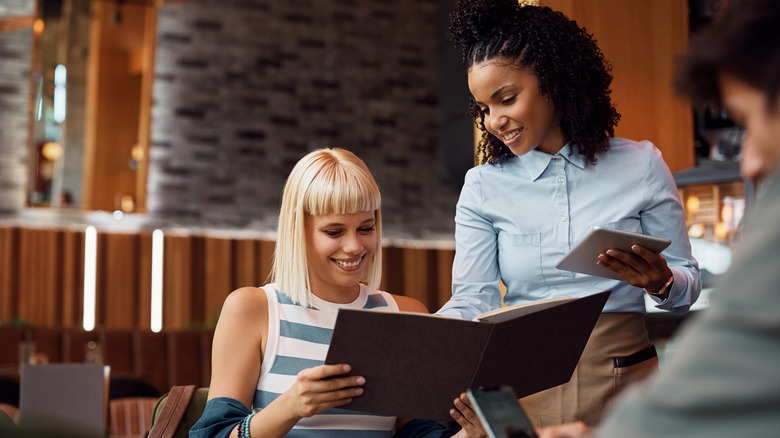The Drink Ordering Quirk That's A Huge Red Flag For Waiters
According to the U.S. Bureau of Labor Statistics, 1,529,610 people were employed as servers in restaurants and other dining establishments as of 2021. These jobs are incredibly demanding both physically and mentally, especially in busy establishments that frequently see a high volume of customers. Restaurant staff are typically on their feet for many hours each day, usually without substantial break time. They're often tasked with carrying heavy trays to and from tables and must respond quickly to customer requests, or they risk losing the tips that so many depend on just to make ends meet.
Because of the tough working environment that servers face, restaurant patrons have a duty to conduct themselves in a respectable manner when visiting dining establishments. Sadly, this is not always the case, as some customers routinely make serious lapses in etiquette that range from thoughtless to being downright rude. The internet is replete with stories from servers on the front lines exposing rude behavior, such as the patron who left a fake $20 bill instead of a tip, or the charming individual who decided to take off their shoes and kick up their feet in public. Even people who pride themselves on politeness may act in a way that raises the ire of their servers. In fact, one behavior that accompanies a drink order is a constant source of consternation for waiters and waitresses.
A little kindness goes a long way
Servers spend the majority of their time at work surrounded by the public. That means they're exposed to all sorts of behaviors, some of which can be majorly aggravating. For instance, it's just good manners to call a dining establishment beforehand when you have a large group. Doing so ensures you can be reasonably accommodated, while also giving the wait staff a head's up so they can provide the best experience possible. Similarly, it's not wise to demand a specific table in a busy restaurant, especially if that table is intended for a larger group and yours only consists of two or three people.
While not quite as disruptive, many servers also have complaints about how they're greeted by customers. Upon arriving at a table, servers usually ask how you are before getting to the formalities of ordering. A kind response would be, "I'm good, how about you?" or some variation, which is about as basic as it gets when it comes to etiquette. Shockingly, far too many restaurant goers respond to this polite query by rattling off their drink orders without even addressing the question. It takes little effort to be a kind and considerate human, especially when you have the privilege of dining out. By the same token, you can create a pleasant experience for all involved when restaurant patrons prioritize politeness.
Simple yet effective ways to improve your restaurant experience
Even the best servers will make mistakes from time to time, despite how diligent they are about providing great service to customers. And virtually all servers want to know when customers are unsatisfied or unhappy with some aspect of their meal, as it means they can work to correct the error. Having said that, a server's mistake is not a blanket excuse to act in a rude or hostile manner. Consider that the mistake could have originated in the kitchen or resulted from a simple misunderstanding. There is a wide distance between behaving assertively to address an issue and verbally abusing a person who works for tips because they forget to add a slice of lemon to your water.
Speaking of tipping, don't let your opinions on tipping culture prevent you from being a decent human being. Tipping is non-negotiable in American dining establishments where tipped employees receive just $2.13 per hour according to the U.S. Department of Labor. In addition to being the right thing to do in most cases, tipping also benefits patrons. If you regularly visit an establishment and tip well, you're likely to receive gold-star treatment every time you come back. You can also rest easy knowing you're not one of the customers that cause the entire wait staff to cringe every time they walk through the door.


